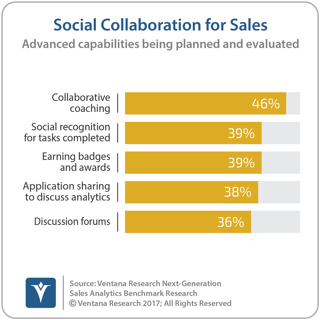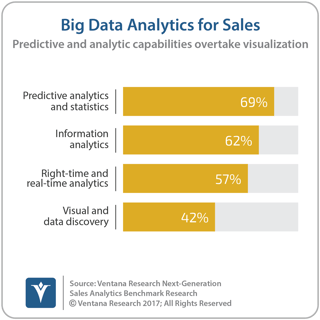Our firm regularly explores the impacts of new technologies on business. Analytics is foremost among recently emerging technologies, which our benchmark research consistently confirms. In our research on next-generation sales analytics, fourth-fifths (82%) of participating organizations cited analytics as the most important technology trend for sales; however, several other technologies also are adding power and flexibility to the use of sales analytics.
To reckon with the flood of data now available, big data systems for processing and storing data have evolved quickly so sales organizations can extract practical insights from masses of information. Advances in mobile technology make it possible to access analytics from smartphones and tablets, enabling users to make informed decisions on the go. Cloud computing for sales applications and data integration facilitates access to and use of sales analytics. A new generation of collaborative tools enables sales teams to communicate and coordinate sales analytics with sales operations, managers and sales reps so that they can plan and execute more effectively. These technologies are changing the ways in which sales organizations utilize analytics.
Half of participants (51%) said cloud computing is a critical technology trend for sales analytics; these systems make it easy for users in varied locations to access data and analytics and are usually less expensive than systems deployed on-premises. Eighty percent of organizations participating in this research said they already use cloud computing or will use it eventually. Although more organizations currently use on-premises deployment (41% vs. 30%), our research suggests that within a year that balance will shift in favor of the cloud (37% vs. 25%). Three-fourths of organizations that have been using cloud computing for sales analytics for more than a year said they are satisfied with it.
Another useful technology for supporting sales analytics is mobility, through devices such as smartphones and tablets, which 42 percent of research participants said are important for improving operations of sales analytics. Half or more of organizations using mobile technology said it has improved their access to and utilization of sales analytics significantly (15%) or slightly (45%), and has improved the timeliness of sales analytics significantly (17%) or slightly (36%). More than half support mobile access to sales analytics. Among industries, 69 percent of finance, insurance and real estate companies support mobile devices for this purpose; they also most often reported that they are satisfied with them.
mobile access to sales analytics. Among industries, 69 percent of finance, insurance and real estate companies support mobile devices for this purpose; they also most often reported that they are satisfied with them.
Yet another supporting technology is social and business collaboration. Although nearly half (46%) of participants said collaboration is a critical technology trend for improving sales analytics use, only 31 percent currently have technology supporting collaboration. One in three (32%) said they do not intend to use collaboration with sales analytics, suggesting that many have not yet made the connection between collaboration and analysis. This is unfortunate as electronic mail and meetings are not as immediate or contextual to take action on issues and opportunities. While social collaboration trails older forms of collaboration such as instant messaging, discussion forums and application sharing, significant percentages of organizations said they plan to use or are evaluating more innovative social tools such as collaborative coaching, social recognition for contributing to or accomplishing tasks and earning badges and awards as part of achievements or contests. Our sales analytics systems need to more informative and present information that cab be read and more easily understand the insights and issues that must be addressed. Just visualizing analytics is insufficient in collaboration across the sales organization. Thus we expect this trend to continue to transition sales into a more agile and collaborative organization.
Finally, big data technology can help organizations collect, store and prepare the masses of diverse data they receive. I covered the merits of preparing and wrangling data for sales analytics where I highlighted this foundation process and methods. Our research found that half of research participants (59%) said big data is important for sales analytics; one-fourth said they use it now, and 14 percent said they plan to use it within a year. Big data technology that supports sales analytics addresses the unceasing growth of data and its impacts on accounts and territories. Properly applied, big data analytics provides many opportunities; organizations (69%) most often reported that predictive analytics and statistics is important. Recent advancements in machine learning can process sales and related data to prioritize and determine where action should be taken in areas that might not be as evident than just viewing reports and dashboards.
process and methods. Our research found that half of research participants (59%) said big data is important for sales analytics; one-fourth said they use it now, and 14 percent said they plan to use it within a year. Big data technology that supports sales analytics addresses the unceasing growth of data and its impacts on accounts and territories. Properly applied, big data analytics provides many opportunities; organizations (69%) most often reported that predictive analytics and statistics is important. Recent advancements in machine learning can process sales and related data to prioritize and determine where action should be taken in areas that might not be as evident than just viewing reports and dashboards.
No company can expect to understand or respond effectively to changes in today’s fast-moving sales environment without the capability to analyze the data it captures quickly and thoroughly. To keep up with, surpass and stay ahead of the competition, organizations must invest in tools that manage the process of analytics and the underlying data so decision-makers can take the right steps. This research shows that to reach their sales goals, most companies will need to make further investments in analytics to manage sales performance and revenue potential as I recently wrote. Accomplishing this requires ensuring that the use of digital technologies like big data, collaboration and mobile technology boost sales analytics efforts. Sales analytics are the foundation to support the planning and forecasting needs that sales can guide their future efforts. Just deploying a dashboard will not be sufficient for success – the ability to access information, collaborate and take action on it is ultimately more important than the sales analytics data itself. Examine your efforts and determine if you are taking advantage of these digital technologies that will engage your sales force and make them effective in their processes and their needs.
Regards,
Mark Smith
CEO and Chief Research Officer
Follow Me on Twitter and Connect with me on LinkedIn.













